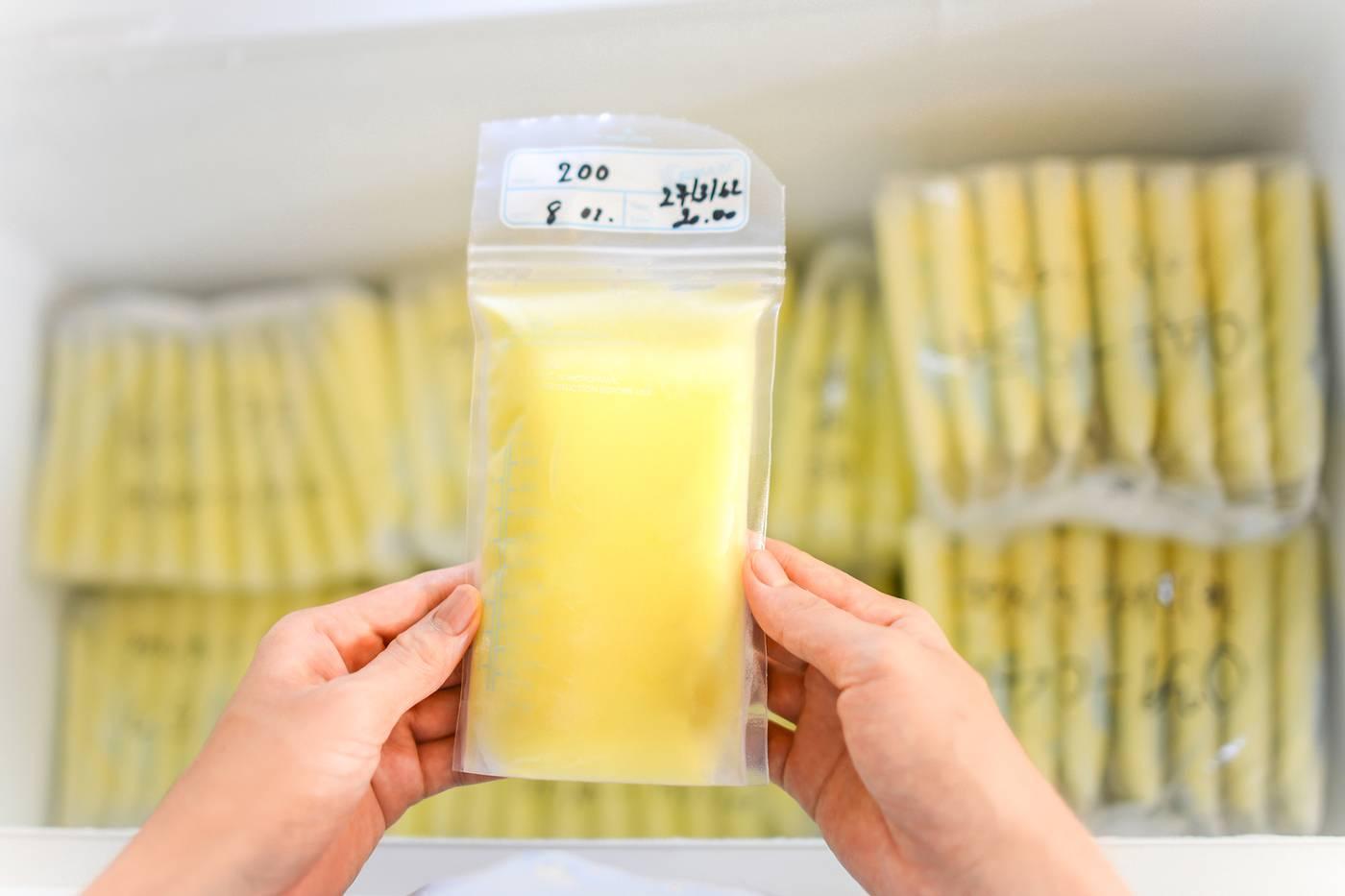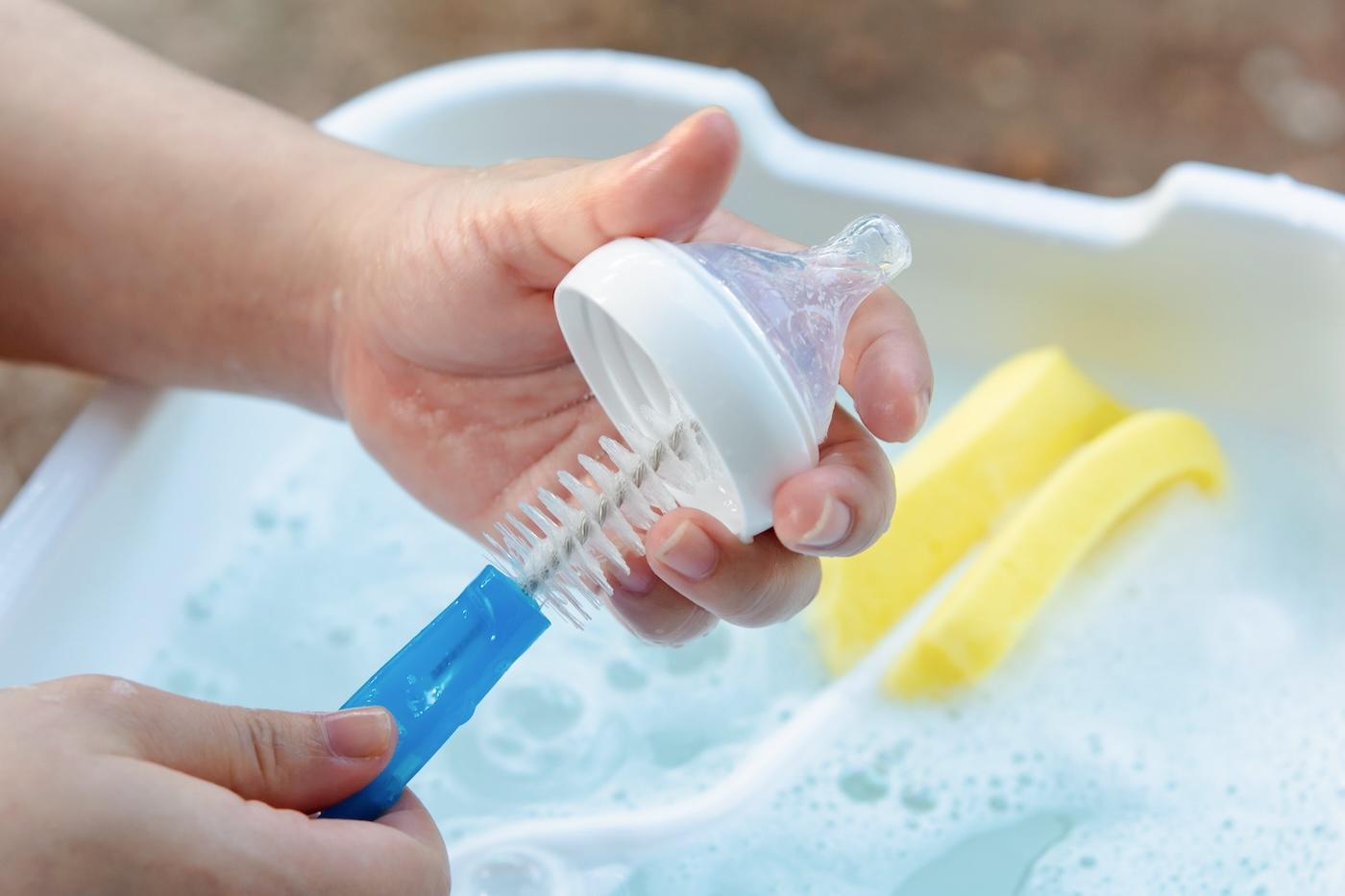BABY
How Long Is Breastmilk Good For?
Everything you need to know about refrigerating, freezing, and thawing breastmilk.

Written by
Gabrielle McPherson, MS, RDN, LDN

Whether you’re pumping and storing breastmilk for your own baby or donating breastmilk to families in need, we’ve got all the details on how to safely store, freeze, and thaw breastmilk. Plus, we answer the pressing question: How long is breastmilk good for?
Breastmilk Storage Basics
Properly storing breastmilk preserves its immune-supporting nutrients to help your baby thrive. Plus, it ensures your hard work does not go to waste! Here’s how to store breastmilk safely:
-
Keep it sanitary. No matter if you’re at home, work, or school, wash your hands well with soap and water for 20 seconds before you pump. While you’re at it, make sure your pump supplies and bottles are clean and disinfected prior to use. - Choose the right supplies. Store your breastmilk in clean breastmilk storage bags or food-grade glass or plastic containers with tight seals. Don’t use containers featuring the “recycle symbol number 7” as they contain BPA, an unsafe chemical found in plastic. Never store your breastmilk in disposable bottle liners or plastic bags that aren’t specially designed for breastmilk.
- Less is more. Consider storing in small amounts, such as two to four ounces. This way you can thaw and combine frozen bags to get to your desired amount, rather than potentially thawing too much and having to throw some of it out.
- Don’t overfill. Because breastmilk expands when frozen, leave about one inch of room at the top of your sealable storage bag, bottle, or food-grade container.
- Remove air. Take out as much air from the breastmilk storage bags as you can before freezing. This’ll help sidestep possible freezer burn.
- Label before storing. Always write the date you expressed your breastmilk on the storage container, so you know when to use it—and how long it will last.
- Freeze ASAP. If you know you won’t use your freshly expressed breastmilk within four days, freeze it immediately to preserve the quality of your milk.
- Start from the back. When tapping your frozen or refrigerated breastmilk stash, be sure to work backward, using the oldest milk first.
How long is breastmilk good for at room temperature?
Have you ever accidentally left your freshly pumped breastmilk out on the kitchen counter…and not realized it till hours later? Yikes! To a nursing parent, spoiled (or spilled) breastmilk is what nightmares are made of. But take heart: Because breastmilk has such powerful antiviral and antibacterial ingredients, it can safely remain at room temperature for up to four hours. (That’s twice as long as baby formula.) Just keep in mind that “room temperature” must not exceed 77 degrees Fahrenheit.
How long is breastmilk good for in the refrigerator?
Expressed breastmilk will stay fresh in a 40-degrees Fahrenheit refrigerator for up to four days. But don’t just willy-nilly toss your liquid gold anywhere in the fridge. The further back you can store your breastmilk, the colder—and safer—it’ll be. It’s never a good idea to keep expressed breastmilk inside the refrigerator door, which is the warmest part of the appliance, thanks to your family opening and closing the refrigerator throughout the day.
How long is breastmilk good for in the freezer?
Good news! Expressed breastmilk remains high-quality in the freezer for up to six months and can be safely stored for up to a year. Even though the milk continues to be safe to drink for a year, after the six-month mark, the nutritional value begins to diminish, notes the Centers for Disease Control and Prevention.
How long is breastmilk good for after thawing?
While you don’t have to use thawed breastmilk immediately, there’s a window of use you need to adhere to.
-
At room temperature: Thawed breastmilk can stay at room temperature for one to two hours…as long as the room is less than 77 degrees Fahrenheit. - In the refrigerator: Once thawed, refrigerated breastmilk is good for 24 hours.
How to safely thaw breastmilk:
Before you dip into the breastmilk bank in your freezer, it’s imperative to learn how to thaw your breastmilk correctly…and what to do with leftover thawed milk. That’s because, while breastmilk is 100% natural, it’s prone to contamination from bacteria and viruses if handled wrong.
The key is knowing which frozen breastmilk storage container to thaw first. Hint: It’s always the oldest one, because it’s closer to expiration than the others. You can thaw your breastmilk a couple of ways, depending on how quickly you need to use it. If…
-
You need to feed your baby now: Thaw your breastmilk by setting the frozen storage container into another vessel full of warm or lukewarm water, like you’re giving your breastmilk a bath. - You need to feed your baby in the near future: Place your frozen breastmilk in the fridge and let it thaw overnight. (Use it within 24 hours after it’s thawed.)
How not to thaw breastmilk:
Yes, there are wrong ways to thaw your breastmilk. In fact, these missteps might even lessen breastmilk’s health benefits.
-
Never microwave breastmilk. This not only puts your baby at risk for serious burns, it also damages your breastmilk’s nutrients. - Don’t refreeze thawed breastmilk: Once breastmilk has been thawed, avoid refreezing. (It’s thought that this may break down nutrients and increase the chance of bacterial growth.)
What do I do with leftover breastmilk?
Whether your baby leaves a bottle half-full of freshly expressed breastmilk or thawed breastmilk, the remaining milk should be consumed within two hours. If it’s been longer, it’s recommended that you toss the leftover breastmilk as the potential for bacterial contamination goes up.
How long is breastmilk good for in a cooler?
Breastmilk can be safely stored in an insulated cooler with frozen ice packs for up to 24 hours. (Be sure to place your breastmilk next to the ice packs right after you’re done pumping.) When you arrive at your destination, either use the breastmilk right away or quickly store it in the fridge or freezer.
Breastmilk Storage Cheat Sheet
- 4 hours at room temperature
- 4 days in the fridge
- 6-12 months in the freezer
More Breastfeeding Tips:
-
10 Practical Tips to Make Pumping Suck a Little Less - Breastmilk and Formula: Your Guide to Combo Feeding
- Breastfeeding Help: What to Do if Nursing Is Hard?
- Do I Have to Pump and Dump? The Truth About Alcohol and Breastfeeding
Disclaimer: The information on our site is NOT medical advice for any specific person or condition. It is only meant as general information. If you have any medical questions and concerns about your child or yourself, please contact your health provider.
SHARE THIS ARTICLE
MOST LOVED
Sleepytime Sidekicks
More on Baby
About Gabrielle McPherson, MS, RDN, LDN
Gabrielle McPherson, MS, RDN, LDN is registered dietitian in Missouri who specializes in community and pediatric nutrition. Gaby is passionate about encouraging families to eat well in simple, practical ways that are realistic...and delicious! When not working, Gaby loves cooking, baking, and making messes and memories with her sous-chef/preschooler Charlotte.












